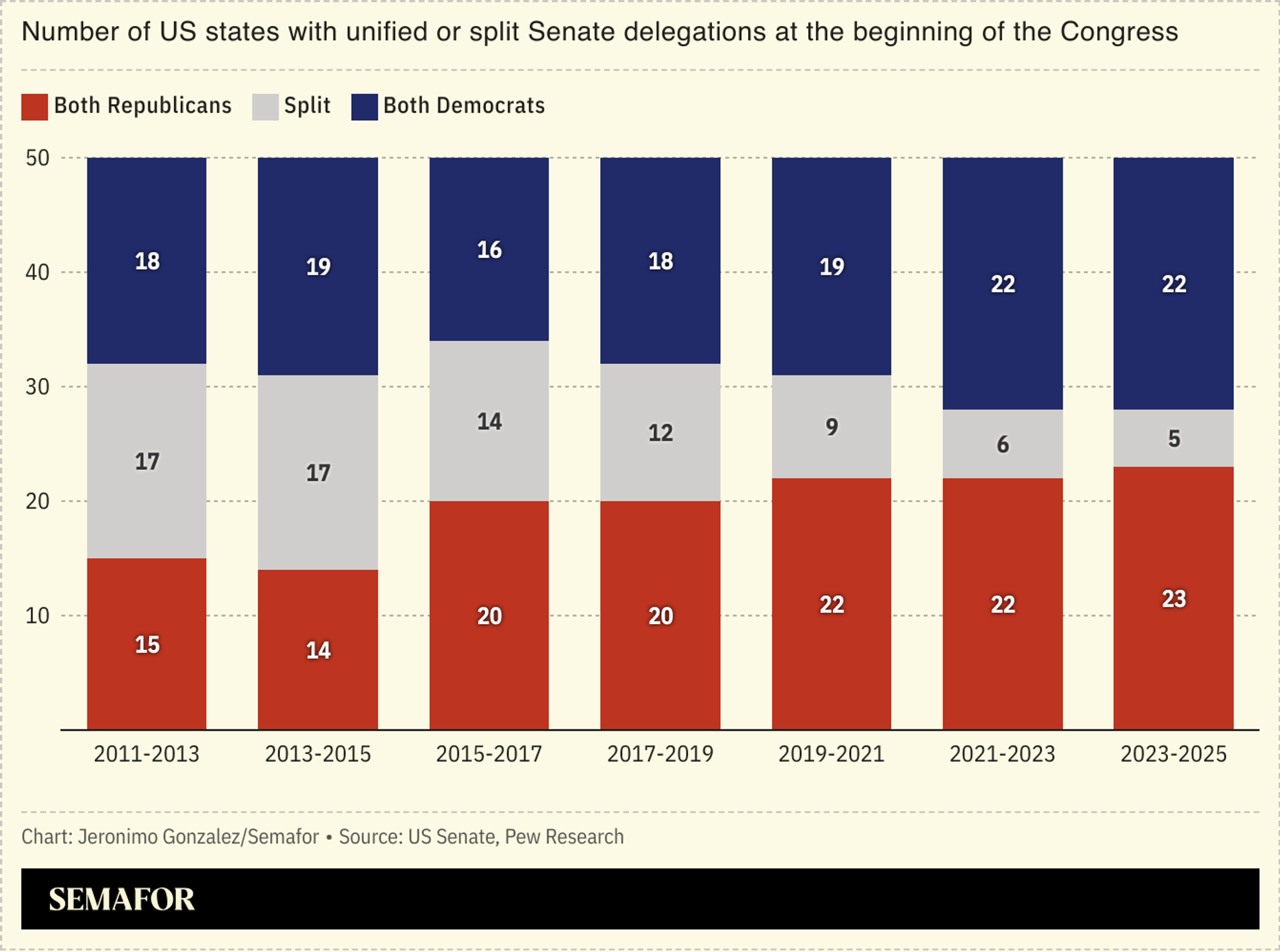The News
PITTSBURGH — Dan Sullivan’s not exactly a Republican firebrand. Yet there he was thousands of miles from home, campaigning against a fellow senator.
The Alaskan trekked to the swing state of Pennsylvania last month on behalf of his longtime friend Dave McCormick, who is seeking to defeat three-term Democratic Sen. Bob Casey.
“It’s unusual,” Sullivan observed of his stumping in the Keystone State, adding that he’s treading carefully: “In my remarks, I’m not mentioning Sen. Casey. It’s not my style. I’m not attacking colleagues.”
Still, members of the famously clubby Senate could return to Washington next week with some hard feelings. Trying to benefit from their best campaign map in six years, Republicans are racing to hit the trail against their Democratic colleagues — and stamping out an already-fading vestige of old-fashioned Senate comity.
Back in 2018, several Republicans took pains to not be seen as undermining their endangered Democratic colleagues, a throwback to the days when senators found it uncouth to campaign against each other. Things have changed so much by now that McCormick’s campaign itinerary is packed with sitting senators, from rank-and-file pragmatists like Sullivan to leadership hopefuls John Thune and John Cornyn.
It’s yet another sign of increasing partisanship. This fall’s election could nearly wipe out the chamber’s five bipartisan Senate delegations; just a decade ago, duos split by party were common.
Sen. Joe Manchin’s retirement ensures West Virginia will have two Republican senators, and Democrats’ two most vulnerable senators are at risk of being knocked out of bipartisan pairs in Ohio and Montana.
If Sen. Tammy Baldwin, D-Wis., also loses her race, it’s possible (if improbable) that Maine has the only split Senate delegation next year. The mere possibility is a bright flare of political realignment.
In this article:
Know More
There’s no better example of the tense cross-partisan atmosphere than in Montana, where GOP campaigns chief Steve Daines recruited a candidate to run against Democrat Jon Tester.
The two men’s rivalry is a long-running saga: Daines campaigned against Tester in 2018, an eyebrow-raising development. Tester survived and helped recruit former Gov. Steve Bullock to run against Daines in 2020.
Tester has smarted at Daines’ maneuvers, accusing Daines of twisting his view on the filibuster in a recent interview. Daines played down the possibility of having to smooth things over next week, predicting that Tim Sheehy would beat Tester and declaring their opposing political views “no secret” to Montanans.

The same dynamics are playing out across the country. Sen. Ron Johnson, R-Wis., is returning the favor against Baldwin’s work to oust him two years ago by stumping for GOP candidate Eric Hovde; the two tailgated with leadership candidates at a Packers game on Sunday. And even before Manchin announced his retirement, rising leadership player Sen. Shelley Moore Capito, R-W.Va., endorsed GOP Gov. Jim Justice.
Ohio Sen. J.D. Vance, now Donald Trump’s running mate, weighed in early for GOP nominee Bernie Moreno, who is challenging Sen. Sherrod Brown.
Vance recalled telling Brown last year that it was nothing personal: “You’re a Democrat. I’m a Republican. I want to get a Republican in that seat.”
Democrats are picking their spots in the trio of competitive seats held by Republicans, though campaigning against fellow senators is certainly a bipartisan affair. Independent Dan Osborn in Nebraska, for one, wants no Democratic help; the party is staying at arm’s-length in Florida and Texas.
The map makes it easy for Republicans to be more aggressive this year. The remarkably open race for several leadership positions is also turning campaign appearances into goodwill operations for ambitious senators.
Sens. Tom Cotton of Arkansas and Joni Ernst of Iowa, who are running for GOP conference chair, are campaigning in battleground states or doing media against sitting Democrats in Ohio, Pennsylvania, Nevada, Wisconsin and Montana. Sen. John Barrasso, R-Wyo., who faces no current opposition in his run for whip, is doing the same.
If GOP candidates win in those swing states, those newly-elected Republicans will have major sway over the next leadership team. If they lose, well, don’t expect any victorious Democratic senators to forget who campaigned against them in their backyards.
Burgess’s view
Senators can still surprise you by coming together on critical issues, but on the trail it’s not even close to a time for unity.
It’s very possible that the five split Senate delegations will shrink to four given West Virginia — and the final number could look closer to one. Only in Vacationland is it clear that Independent Sen. Angus King, who caucuses with Democrats, will return to represent the state alongside Maine Republican Susan Collins.
And even if Republicans can pull off a win in states that currently have two Democratic senators right now, the overall trendline is clearly negative. Manchin hated when senators campaigned against each other and even endorsed some Republicans; his retirement presages a new era.
